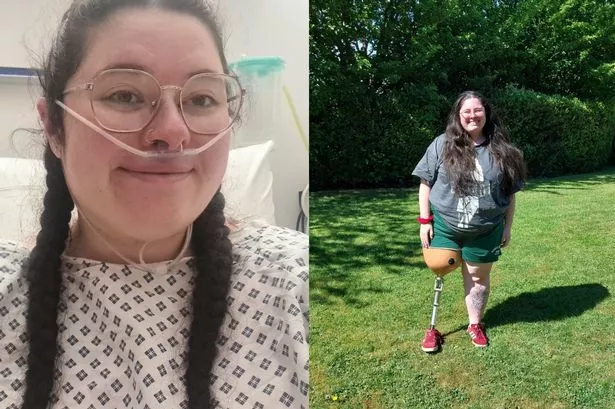Health
NHS Nurse’s Tumour Diagnosis Leads to Life-Altering Amputation

An intensive care nurse from Merseyside, Sophie Fay, faced a life-changing diagnosis after experiencing persistent pain in her leg. Initially believing the discomfort to be a minor muscle injury, the 26-year-old later discovered that a large tumour had developed, necessitating the amputation of her leg.
Sophie first felt an “aching” sensation behind her right knee while training with a personal trainer in March 2024. As the months progressed, the pain intensified, making even simple activities difficult. By August 2024, Sophie noticed her calf had become swollen and warm to the touch, prompting concern among her colleagues, who suggested it could be a blood clot.
After seeking medical attention, Sophie underwent an MRI scan in November 2024, revealing a significant mass in her calf. The diagnosis confirmed that she had spindle cell sarcoma, a rare form of soft-tissue tumour. According to the Bone Cancer Research Trust, these tumours typically affect individuals over the age of 40 and account for only 2-5 percent of all primary bone cancer cases.
Given the tumour’s severity, doctors informed Sophie that an above-the-knee amputation was the only viable treatment option. In December 2024, she underwent the procedure and has since begun adapting to life with a prosthetic limb.
Raising Awareness Through Personal Experience
Sophie is now sharing her story during Bone Cancer Awareness Week, which runs from October 6 to 12, 2024. Her aim is to raise awareness about the symptoms of bone cancer and ensure that others do not experience delays in diagnosis similar to hers.
Reflecting on her journey, Sophie expressed, “It was a massive shock, but it felt like the best chance of living a normal-ish life afterwards.” She emphasized the importance of being proactive about health concerns, urging others to recognize the signs that could indicate serious conditions like bone cancer.
Sophie acknowledged her initial misinterpretation of her symptoms, stating, “I think it was really easy to say I was a young girl who pulled a muscle while exercising – I even made that conclusion in my own head.”
Now working in a non-clinical role, Sophie has noticed a shift in her emotional state since her amputation. She is determined to contribute to the conversation around bone cancer, highlighting the need for increased awareness among healthcare professionals.
“Sharing my story means bone cancer is spoken about more within healthcare,” she stated. “Knowing what to look out for could mean that people like me don’t fall through the cracks.”
For more information on bone cancer and to support ongoing research, visit the Bone Cancer Research Trust at bcrt.org.uk.
-

 Health3 months ago
Health3 months agoNeurologist Warns Excessive Use of Supplements Can Harm Brain
-

 Health3 months ago
Health3 months agoFiona Phillips’ Husband Shares Heartfelt Update on Her Alzheimer’s Journey
-

 Science1 month ago
Science1 month agoBrian Cox Addresses Claims of Alien Probe in 3I/ATLAS Discovery
-

 Science1 month ago
Science1 month agoNASA Investigates Unusual Comet 3I/ATLAS; New Findings Emerge
-

 Science4 weeks ago
Science4 weeks agoScientists Examine 3I/ATLAS: Alien Artifact or Cosmic Oddity?
-

 Entertainment4 months ago
Entertainment4 months agoKerry Katona Discusses Future Baby Plans and Brian McFadden’s Wedding
-

 Science4 weeks ago
Science4 weeks agoNASA Investigates Speedy Object 3I/ATLAS, Sparking Speculation
-

 Entertainment4 months ago
Entertainment4 months agoEmmerdale Faces Tension as Dylan and April’s Lives Hang in the Balance
-

 World3 months ago
World3 months agoCole Palmer’s Cryptic Message to Kobbie Mainoo Following Loan Talks
-

 Science4 weeks ago
Science4 weeks agoNASA Scientists Explore Origins of 3I/ATLAS, a Fast-Moving Visitor
-

 Entertainment4 months ago
Entertainment4 months agoLove Island Star Toni Laite’s Mother Expresses Disappointment Over Coupling Decision
-

 Entertainment3 months ago
Entertainment3 months agoMajor Cast Changes at Coronation Street: Exits and Returns in 2025









